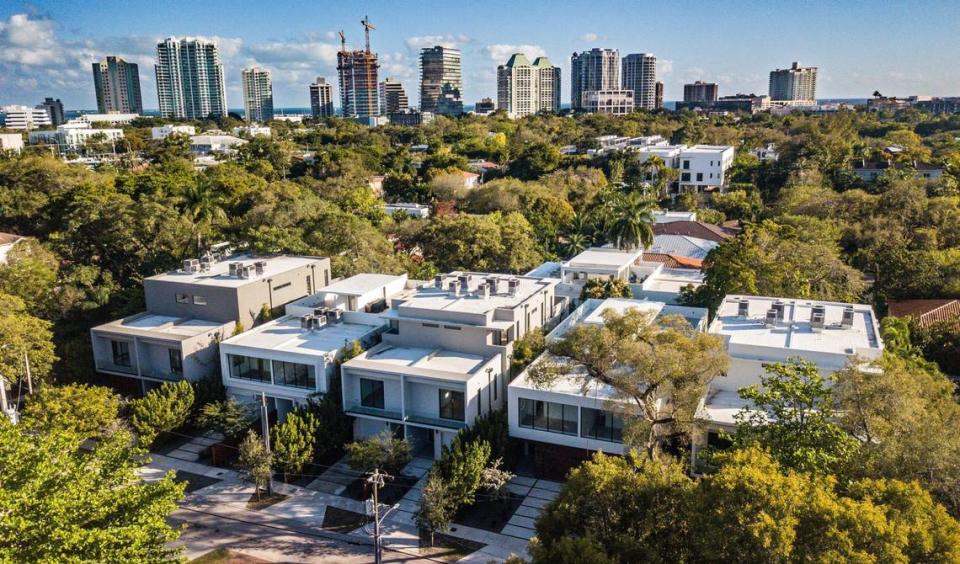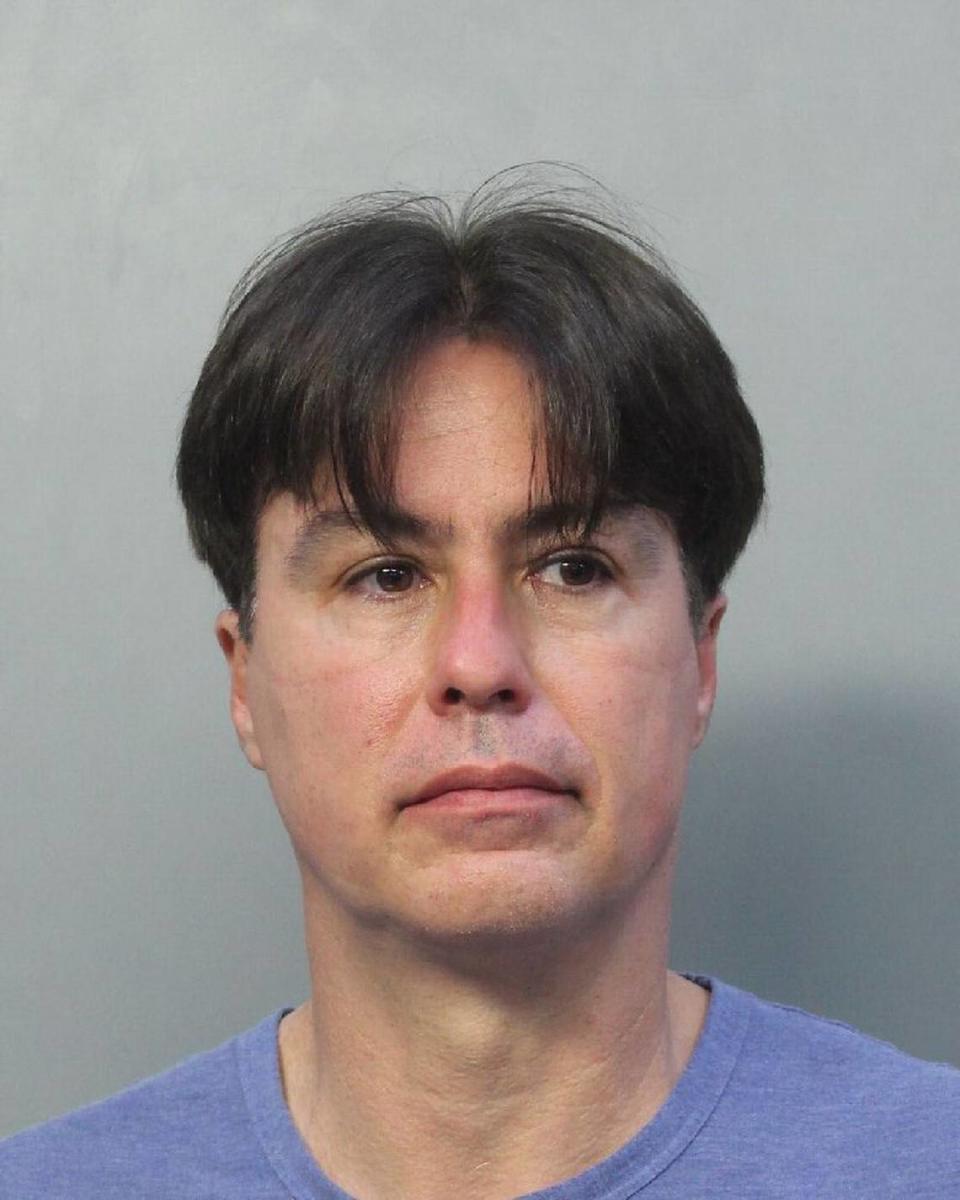Judge will decide whether to sell disputed Coconut Grove townhouses with defects
Testy arguments over the fate of Coconut Grove townhouses built by a developer accused of fraud were presented to a Miami-Dade Circuit Court judge, with one side asking to sell them now at top-of-the-market prices despite defects and the other pleading for consideration of home buyers who signed purchase contracts starting in 2018 but never moved in.
“We got into the mess because properties under contract were being sold for higher prices, and that’s exactly what’s going on here,” said Marko Cerenko, an attorney for the buyers. “If you don’t want to repudiate the contracts then why not honor them?”
Impossible, responded Alan Fine, the former judge appointed receiver last May to oversee a morass of lawsuits against developer Doug Cox, the self-styled “King of Coconut Grove” who pocketed multiple deposits and signed multiple contracts with unsuspecting buyers over four years as the real estate market surged, they allege.
“We don’t have the luxury of offering to honor every contract because in most instances there are multiple contracts for the same property. It’s a mess,” Fine’s counsel, Paul Singerman, said at a hearing Wednesday. “But we are coming out of the fog and into the light.”
Fine has asked Judge Tom Rebull to approve sales procedures for 12 townhouses in the 2900 block of Coconut Avenue, pristine homes that Cox billed as the Coconut City Villas. Buyers who put down $155,000 starting in 2018 and up to $1.5 million in 2023 were strung along by Cox, they say, as he repeatedly postponed closing dates. He said he was delayed in completing inspections on finishing touches and couldn’t obtain certificates of occupancy from the city’s building department.

Cox owes $40 million to buyers, investors and lenders, according to court filings. Fine’s investigators found two Cox bank accounts containing a total of $269 but hasn’t been able to find any other missing money. Dozens of pages of Cox’s income and expense records filed by Fine show Cox receiving and repaying at significantly higher amounts what appear to be loans from such firms as Last Chance Funding, High Speed Capital and On Deck Capital. Lots of Cox’s money could have been drained by mismanagement as he got deeper into debt, Singerman said. Cox denies any wrongdoing.
Fine has listed one of the four-bedroom townhouses for $2.7 million and one the five-bedroom houses for $3.3 million, double their original prices. They still don’t have COs, and nobody can move in until they do. Problems persist with custom glass railings and electrical wiring in the swimming pools, among other things.
Buyers, especially the original ones whose lives have been put on hold for years, want a shot at buying the houses, if not at the price they signed for then at a discount off current market value. After all, they lost out on their investments, 2-3 percent mortgage rates, money spent on rent, storage and legal expenses, and time wrangling with Cox and the city.

But some buyers signed away their rights in one-sided contracts, they are lower in the pecking order than secured creditors who used the properties as collateral and there is no money to repay the $40 million owed unless the properties are sold for the highest dollar, Fine says.
“The receiver has decided to reject and repudiate existing contracts and instead of selling to the people who signed them he wants to sell everything for a pot of money,” said attorney Josh Migdal, who is representing buyers. “This is not a bankruptcy, as much as the receiver would like it to be. Do what’s fair.”
READ MORE: They bought their dream homes from the ‘King of Coconut Grove.’ They still can’t move in
The suggestion that Fine is “ordering a fire sale couldn’t be farther from the truth,” Singerman said. “The real estate will be aligned with the stakeholders’ interests to get the maximum amount. We are seeking an order approving a sales procedure where all claims and liens will be attached to the proceeds so as not to cloud title.”
“If people want to hire lawyers to fuss with each other over the pot and their claims to it, have at it. But claiming superior lien rights is inappropriate to this motion. We don’t want any backdoor play to impair the sales procedure.”
Rebull addressed the anger of buyers who say they have been neglected and left in the dark by the receiver even though it was a small group of original buyers who came forward to expose Cox and what they say was a real estate Ponzi scheme abetted by the city’s lack of enforcement.
“I’m keenly aware this is a disaster for your clients,” Rebull said. “I have incredible sympathy and empathy for what happened. But I’m not allowed to make decisions based on feelings. I have to abide by laws. Nothing is good that comes out of litigation. Maybe for the lawyers but not for the humans.
“Rarely in a dispute does anyone come out whole.”
Fine also needs cash to pay his own expenses and $750-per-hour fees and those of Singerman, forensic accountants and real estate brokers. He’s racking up $5,000 in interest per day on a settlement and can’t get expensive insurance on the houses as hurricane season approaches. But buyers assert costs are to be borne by Phillip Sylvester, Cox’s former business partner who bankrolled the Grove property purchases. Sylvester says Cox deceived him, broke their agreement and owes him $6 million. In an emergency request, Sylvester sought a court-appointed receiver to stop Cox last March after Sylvester read a Miami Herald article about Cox and the stranded home buyers.
“The applicant, Mr. Sylvester, who asked for a receiver, stands to benefit most from a receivership,” said attorney Alexander Lian, who represents buyers. “We need more clarity on the financial state of the receivership and who is responsible to pay the costs because they say they need to unload these houses now to pay their costs. Why do the buyers have to take a hit when the party supposed to bear the costs needs to step up?”
Sylvester paid off a $34 million loan Altamar Financial Group made to Cox in 2019. Altamar gave Cox six extensions into 2023 despite the fact Cox had not closed on a single home. Altamar, the largest secured creditor, was demanding 25 percent interest while objecting to Fine’s plan to sell the properties, and litigation against the lender would have taken years, Fine said. Sylvester managed to settle with Altamar for its principle amount during a private mediation session, but buyers complained Altamar was let off the hook too easy after giving ill-advised extensions to Cox.
Sylvester also purchased a dozen Grove lots under the receiver’s control for $16.5 million. Sylvester had previously purchased them for Cox to build houses on, as part of their deal. But Cox never did, despite showing buyers renderings of luxury homes and signing contracts with them.
“Mr. Sylvester has funded this receivership with $1 million toward costs and paid $34 million to settle with Altamar,” said Marcos Jimenez, Sylvester’s attorney and former U.S. Attorney in Miami. “He is losing money and sleep over this deal and doing everything he can to make it right.”
Migdal said he was skeptical of altruistic motives with so much money at stake. He said lenders are getting preferential treatment and buyers shouldn’t be expected to bail out companies making bad loans.
“The receiver has picked the winners and losers already,” Migdal said. “Altamar got all its principle back. The other lenders are supporting these sales. But the depositors have not received any offers. This is not a white knight thing.”
Singerman countered: “The rights of secured creditors are superior, yes. You can criticize me for picking favorites but we are following the law.”
Jimenez proposed mediation.
“The best way to stop the bleeding is to get everyone in a room and have a mediation to agree to sell for the best price possible,” he said.


